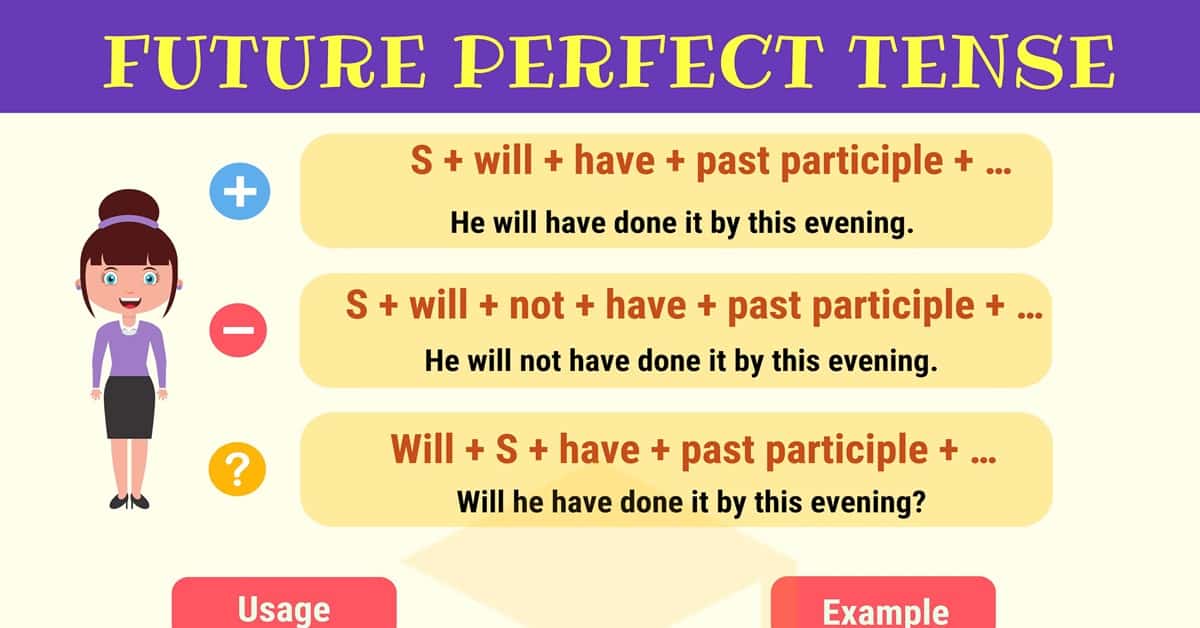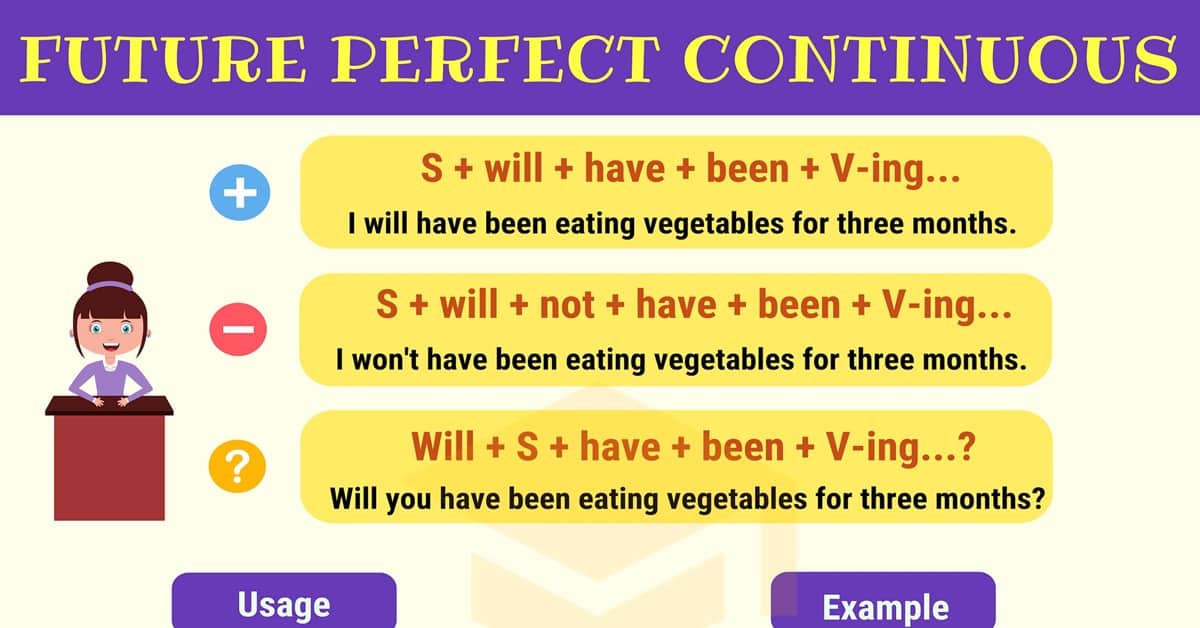Introduction
Tense is a term in English grammar and refers to a form of the verb that indicates time. Time is a universal, non-linguistic concept with three divisions - Past, Present and Future; by tense, we understand the correspondence between the form of the verb and our concept of time. When making a statement it is essential to indicate whether a situation exists now, existed in the past or is likely to exist in the future.
Future Perfect Tense - rules and examples
The future perfect tense is used to describe an action that will take place between now and some time in the future. Assume your friend Linda asks you to look after her cat for a few days while she goes on vacation. She wants you to come over today at noon so she can show you where to find the cat food and how to mash it just right in the bowl so Fluffy will eat it. But because you have a busy afternoon, you ask Linda if you can come at eight o'clock tonight instead.
Rules and examples future perfect:
✅ Rule 1
It indicates an action which will be finished before a certain time in the future; as,
- I shall have come back from office before you
✅ Rule 2
It is used to express the speaker’s belief that something has taken place; as,
- You will have heard of Ashoka’s victory.
✅ Rule 3
Sometimes it is used to express a past possibility; as,
- She will have purchased a new sari.
✅ Affirmative Sentences
Pattern:
➤ Subject + will/shall + have + verb (IIIrd form) + object.
- All the guests will have taken dinner.
- We shall have finished our work by then.
- Ramesh will have completed his studies by the time his father retires.
✅ Negative Sentences
Pattern:
➤ Subject + will not/shall not + have + verb (IIIrd form) + object.
- The thief will not have fled before the police reach there.
- We shall not have finished our game before father comes here.
- They will not have written the essay before the teacher comes.
✅ Interrogative Sentences
Pattern:
➤ Will/Shall + subject + have + verb (IIIrd form) + object?
➤ Q. W. + will/shall + subject + have + verb (IIIrd form) + object?
- Will you have completed your course before the examination begins?
- Will they have reached the station before the train departs?
- How will they have reached the field before it starts raining?
✅ Interrogative Negative Sentences
Pattern:
➤ Will/Shall + subject + not + have + verb (IIIrd form) + object?
➤ Q.W. + will/shall + subject + not + have + verb (IIIrd form) + object?
- Will you not have reached the office before 10 o’clock?
- Shall we not have eaten food before the guests come?
- Why will he not have finished his work before Monday?
Future Perfect Continuous Tense - rules and examples
The future perfect continuous, also known as the future perfect progressive, is a verb tense that describes actions that will occur in the future.
Will + have + been + the verb's present participle (verb root + ing) make up the future perfect continuous.
When we describe an action in the future perfect continuous tense, we are looking forward in time and back at how long that activity lasted. The activity will have started in the past, present, or future, and will be expected to continue in the future.
Rules and examples of future perfect continuous:
✅ Rule 1
The future perfect continuous tense is used for actions which will be in progress over a period of time that will end in the future; as
- By next march, we shall have been living here for four years.
✅ Rule 2
We can use the future perfect continuous to emphasize how long something has been going on by a particular point in the future; as,
- On Saturday, we will have been living in this house for a year.
✅ Affirmative Sentences
Pattern:
➤ Subject + will/shall + have been + verb (ing) + object +since/for.
- The girls will have been dancing since 4 o’clock.
- The shoemaker will have been repairing our shoes since morning.
- The gardener will have been watering the plants for two hours.
✅ Negative Sentences
Pattern:
➤ Subject + will/shall + not + have been + verb (ing) + object
- Vedant will not have been driving a bicycle for three hours.
- The labourers will not have been whitewashing the house for four days.
✅ Interrogative Sentences
Pattern:
➤ Will/Shall + subject + have been + verb (ing)?
➤ Q.W. + will/shall + subject + have been + verb (ing)?
- Why will the teacher have been teaching the students since 10 o’clock?
- Will they have been travelling for six hours?
✅ Interrogative Negative Sentences
Pattern:
➤ Will/Shall + subject + not have been + verb (ing) + object?
➤ Q.W. + will/shall + subject + not have been + verb (ing) +object?
- Will the farmers not have been ploughing the field since morning?
- Why will the tailor master not have been sewing any clothes for three days?
You May Also Like 👇
Loading...



